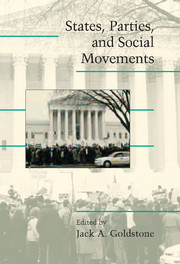Book contents
Afterword: Agendas for Students of Social Movements
Published online by Cambridge University Press: 26 February 2010
Summary
Readers who have worked their way through States, Parties, and Social Movements from beginning to end have probably noticed an agreeable irony. Colleagues McAdam, Goldstone, Luders, Cunningham, Swarts, Cadena-Roa, Glenn, Desai, Williams, and Van Dyke not only study social movements, but also engage in intellectual parallels to social movements: They challenge authorities and conventional wisdom in the name of suppressed or misunderstood alternatives. Collectively, they set before students of social movements a vigorous, vital agenda for the next round of theory and research. As their outstanding contributions to this volume prove, they will surely lead the way in future implementations of that agenda.
Or, rather, those agendas. For each of our authors has selected a different aspect of social movement politics for investigation. Not all agree on such questions as how externally generated opportunities and threats produce their effects on social movement activism, or under what conditions and how social movement challenges generate new political parties. Since Jack Goldstone has opened the book with a splendid review and synthesis of the individual essays, I will resist the temptation to offer my own evaluations and adjudications in favor of spelling out the forthcoming agenda. To do so, however, will require laying out some elementary observations concerning social movements. Our authors generally take these observations for granted, but readers who are not immersed in previous discussions of the subject will no doubt benefit from seeing them out in the open.
- Type
- Chapter
- Information
- States, Parties, and Social Movements , pp. 246 - 256Publisher: Cambridge University PressPrint publication year: 2003
- 5
- Cited by



